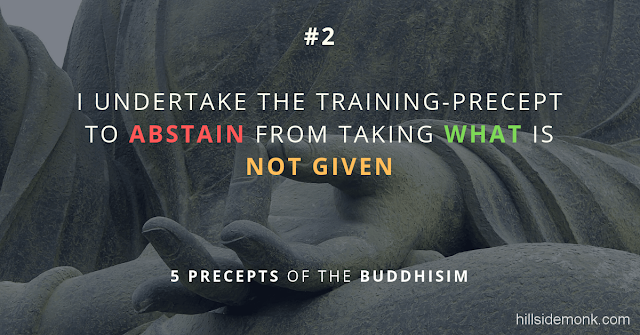5 Precepts Of Buddhism: Into Buddhism
 |
Five precepts are the set of rule of human ethics followed by Buddhist Lay people. They are the people who are not monks, nuns, or novice but do follow these rules. They are called Upasaka (masculine) or Upasikā (feminine) which are from the Sanskrit and Pāli words for "attendant".
These precepts are believed to make mind and character progress towards the path of enlightenment. In some of the countries like China, The ritual of undertaking the five precepts is done as an initiation ceremony to become "Upasaka or Upasika".
But in countries like Thailand, people are assumed to be born Buddhist.
Compassion and "Karma" forms the basis of these 5 precepts. According to some scholars, these rules also complement basic human rights.
The five vows to be held also referred to as the "5 Precepts Of Buddhism" are as below -
- "I undertake the training precept to abstain from onslaught on breathing beings."
- "I undertake the training precept to abstain from taking what is not given."
- "I undertake the training precept to abstain from misconduct concerning sense-pleasures."
- "I undertake the training precept to abstain from false speech."
- "I undertake the training precept to abstain from alcoholic drink or drugs that are an opportunity for heedlessness."
#1
This rule makes the prohibition of killing, both humans and all animals. This is interpreted by Buddhist scholars as opposition to and prohibition of capital punishment, suicide, abortion, and euthanasia.
The accompanying virtues are - Kindness and compassion whereas it is related to the right of life in terms of "Human Rights".
#2
This precept prohibits Theft. The accompanying virtues are Generosity and renunciation whereas it is related to the Right of property in terms of "Human Rights".
#3
The third precept refers to sexual responsibility and long-term commitment. The accompanying virtues are Contentment and respect for faithfulness whereas it is related to the Right to fidelity in marriage in terms of "Human Rights".
#4
The fourth precept involves falsehood spoken or committed to by action, as well as malicious speech, harsh speech, and gossip. The accompanying virtues are Being honest and dependable whereas it is related to the Right of human dignity in terms of "Human Rights".
#5
The fifth precept prohibits intoxication through alcohol, drugs or other means. The accompanying virtues are Mindfulness and responsibility and dependable whereas it is related to the Right of security and safety in terms of "Human Rights".
You don't need to be Buddhist to follow these ethics. Being. human is enough to follow the right things that lead to the right path and good for oneself and society.
These are the means to build a good character and a pure mind and body.
I hope you enjoyed reading 5 Precepts Of Buddhism: Into Buddhism Please let us know your thoughts in the comment section.
you may check out this awesome book -
I hope you learned something valuable to improve yourself from 5 Precepts Of Buddhism: Into Buddhism.
You may also like -
- Krishnamurti Quotes To Enlighten Your Mind And Life
- Bhagavad Geeta Quotes – Lessons For Life
- Facts About Hinduism You Should Know
- 10 Short kindness to make you a better person
- 5 Precepts Of Buddhism: Into Buddhism
- Sadhguru Quotes On Life To Give You New Direction
- 10 Dalai Lama Compassion Quotes To Change Your Life
Reference-
Wiki - under the Creative Commons Attribution-ShareAlike License
5 Precepts Of Buddhism : Into Buddhism
 Reviewed by hillsidemonk
on
May 11, 2019
Rating:
Reviewed by hillsidemonk
on
May 11, 2019
Rating:
 Reviewed by hillsidemonk
on
May 11, 2019
Rating:
Reviewed by hillsidemonk
on
May 11, 2019
Rating:












No comments: